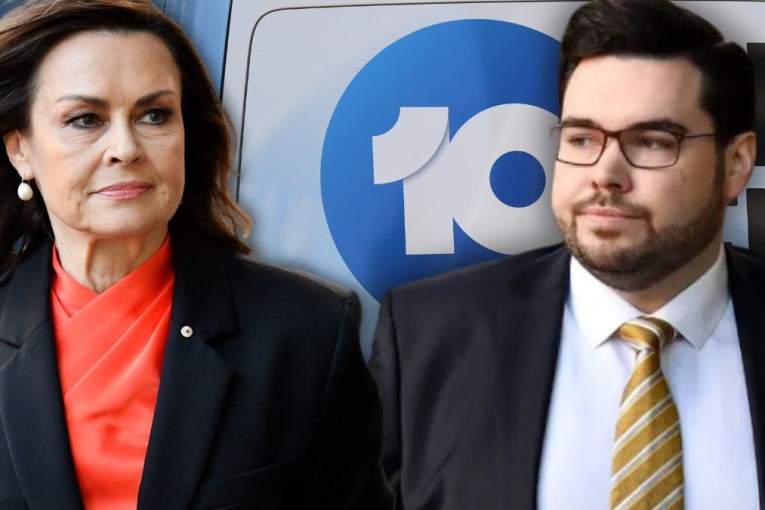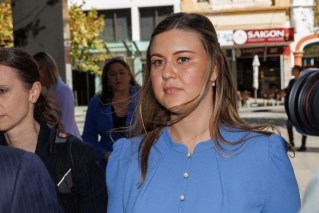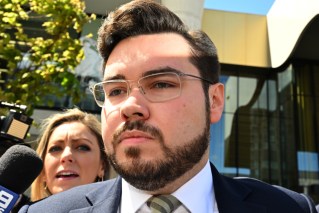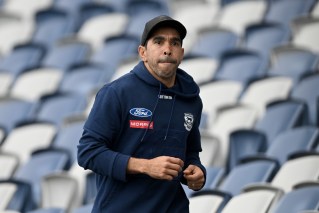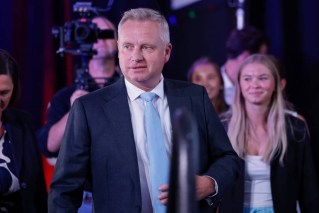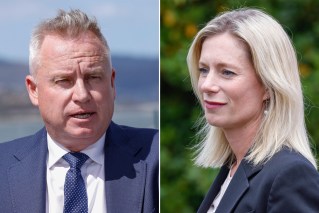‘Strength, resilience, vision and energy’: Jocelyn Newman remembered
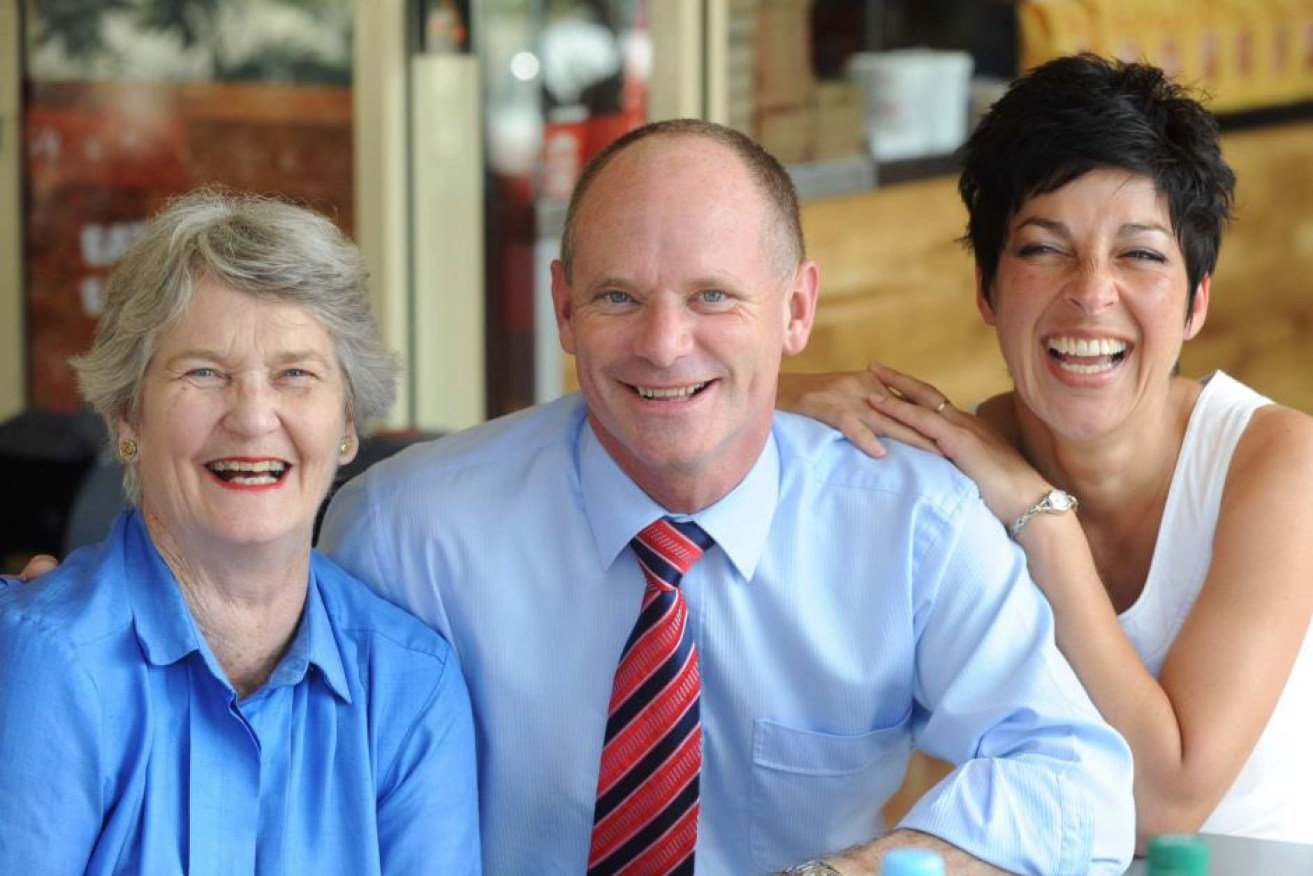
Jocelyn Newman, with son Campbell Newman and his wife Lisa, served as Social Services Minister for five years. Photo: AAP
Jocelyn Newman, at the height of her political career, was described as the most powerful woman in Australia and the Minister for Courage.
She overcame two major cancer operations and the death of her husband Kevin to preside over the federal government’s biggest spending department, Family and Community Services, and major changes to Australia’s welfare system.
The Tasmanian Liberal senator was an ideological mixture. Her conservatism fitted the Howard government’s views on self-reliance and mutual obligation. Critics felt she lacked empathy for the desperate.
Yet she was a founding member of the Women’s Electoral Lobby (WEL), pioneered women’s shelters and once applied for a job with Gough Whitlam.
And while her steely blue eyes and school mistress manner earned her a reputation for iciness, she liked a joke and the odd melodramatic gesture.
Jocelyn Margaret Newman, who died on Easter Sunday following a long battle with Alzheimer’s, was born in Melbourne on July 8, 1937.
She graduated in law from the University of Melbourne, where she won a Miss University quest.
At the age of 24 she married Kevin Newman, a young army officer whom she met on a blind date at an army dance.
They had two children, Campbell and Kate. In March 2012 she was at Campbell’s side when he led the LNP to a crushing win over Labor to become Queensland’s premier.
For 14 years she was an army wife, learning first hand of the difficulties of service life for families.
Kevin Newman entered federal politics in 1975 when he won the Bass by-election with a 17 per cent swing, a watershed result that presaged the Liberals’ return to power under Malcolm Fraser. He was a minister throughout the Fraser years.
During her life as army and politician’s wife, she was largely a stay-at-home mother who still, at various times, worked as a lawyer, farmer and boutique hotelier.
Kevin Newman left politics in 1984 and two years later she became a senator.
Within two years she was in the shadow ministry as defence science and personnel spokesperson, a position she used to champion better conditions for service men and women.
She also pulled a stunt that embarrassed the Hawke government. She armed a staffer with a distinctive red suitcase and booked him onto a flight to Canberra. Just before the plane left, he cancelled his flight but, in breach of security regulations, the case went to the capital.
Newman steadily accumulated responsibilities, including status of women and veterans’ affairs. In 1993 she went into shadow cabinet as spokesman for family and health. That year she had an operation for uterine cancer.

Campbell Newman, escorted by wife Lisa and mother Jocelyn, on the way to become Brisbane Lord Mayor in 2011. Photo: ABC
A year later she found she had breast cancer.
At a dramatic news conference, which she opened by brandishing a bread knife, a gift for a journalist whose coverage she didn’t like, she announced she’d be standing down from the shadow ministry because of the cancer and went on to talk of another disease, the one afflicting her party.
Liberal leaders were in danger of being torn down unless the party developed the habit of loyalty, she said.
Next day she voted in the party room meeting that replaced John Hewson with Alexander Downer and then went into hospital.
She was back inside five months, more quickly than she wanted, when Downer made her an offer she couldn’t refuse – defence.
But when John Howard came to power in 1996, he made her social security minister, a portfolio later morphed into the even wider Family and Community Services.
She also, to the misgiving of radical feminists, assisted the PM on the status of women.
Newman had little time for feminist theory. She believed women should be incorporated into the status quo, rather than change society.
“It’s not the intellectual pursuit of feminist rights so much as what’s fair,” she once said.
A personal trigger was a department store refusing her, a working solicitor, a credit account without her husband’s co-signature.
She had a better track record than her opponents conceded.
Her concerns went back to her time as a lawyer helping victims of domestic violence. In 1972 she’d applied for the job of Whitlam’s women’s adviser, and she’d helped set up women’s shelters.
She only quit WEL when its Tasmanian branch urged the return of Whitlam in 1975. She believed it had become a Labor front.
It was the massive, sprawling $55 billion a year Family and Community Services that consumed Newman’s attention.

Jocelyn Newman, then the family and community services minister, at the launch of Welfare Reform at Parliament House in 2000. Photo: AAP
She oversaw the establishment of a corporatised Centrelink, which took over responsibility for paying all federal government pensions, benefits and allowances and affected the lives of more than 6 million Australians, with its myriad teething problems.
In some ways she was a hardliner in a hardline government – setting up a hotline to to “dob in a dole cheat” and trying to change the support system for homeless youth, which she said mainly benefited “middle class runaways”.
She argued strongly for the need to end welfare dependency and critics said Centrelink’s rules and penalties were harsh and unfair.
But the final fruit of this was the 2000 McClure report. It reinforced the notion of mutual obligation and proposed a standard income support base rate with add-on modules for individual needs like disability and sole parenthood.
As many in the welfare sector acknowledged, it shifted the emphasis from an aggressive clampdown on welfare dependency to more support and less punishment as the way to get people back into the economic mainstream.
Newman won government support for the main thrust of McClure, but couldn’t get a financial commitment to implement it.
Early in 2001 she stepped down from the ministry, finally quitting politics the following year.
She’d had more health problems in the preceding year. But the biggest blow was her husband’s sudden death in 1999.
Their marriage, she’d said, was “a terrific love affair which endured for almost 40 years”.
-AAP

